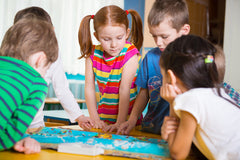Why use games in the classroom?
 I loved playing games as a kid. Candy Land, Battleship, Scrabble, and Uno were among my favorites. If asked as a child, I wouldn’t have described these games as “educational.” They were fun, an escape from learning, the antithesis of the facts and figures and numbers you memorize in school. Yet, if we take a closer look at many children’s games, we’ll find that they’re actually quite complex learning environments that develop a variety of important problem solving, social, and emotional skills. These are the same skills we try to impart to our students every day!
I loved playing games as a kid. Candy Land, Battleship, Scrabble, and Uno were among my favorites. If asked as a child, I wouldn’t have described these games as “educational.” They were fun, an escape from learning, the antithesis of the facts and figures and numbers you memorize in school. Yet, if we take a closer look at many children’s games, we’ll find that they’re actually quite complex learning environments that develop a variety of important problem solving, social, and emotional skills. These are the same skills we try to impart to our students every day!
Keep reading to find out how games promote learning!

 Soon your child will be starting a new school year and entering the next grade. Along with meeting new friends and teachers, your child will be exposed to new, challenging reading, writing, and math content. You, the parent, play a huge role in your child’s academic success. One way you can support your child is by knowing what they are learning in school and reinforcing that knowledge at home. Not only does this help your child do well in the classroom, it also helps you communicate better with your child’s teacher.
Soon your child will be starting a new school year and entering the next grade. Along with meeting new friends and teachers, your child will be exposed to new, challenging reading, writing, and math content. You, the parent, play a huge role in your child’s academic success. One way you can support your child is by knowing what they are learning in school and reinforcing that knowledge at home. Not only does this help your child do well in the classroom, it also helps you communicate better with your child’s teacher.